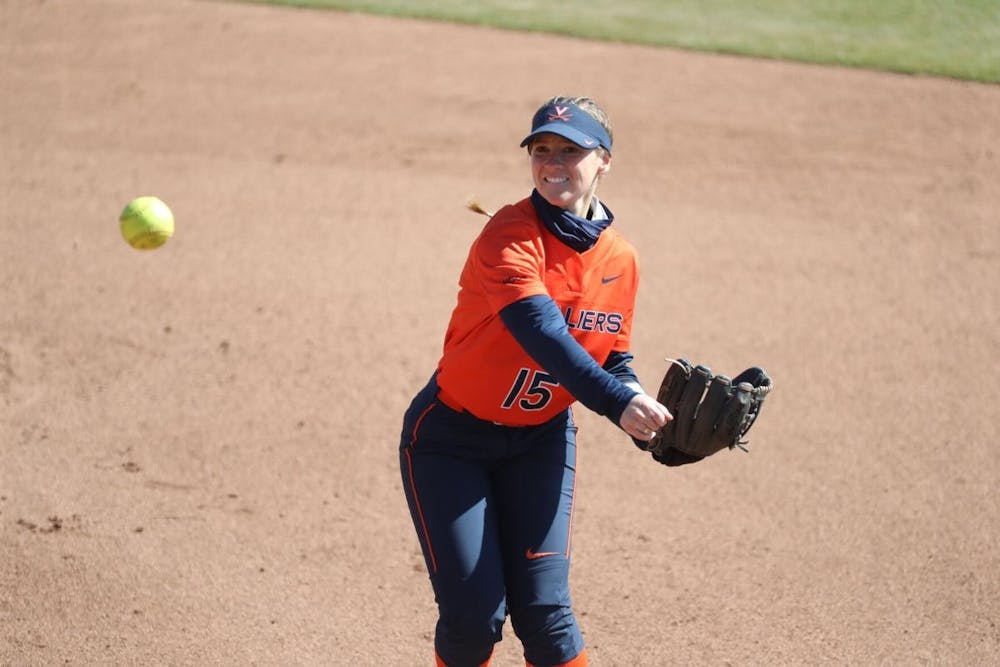It is fall of 2018 and two first-year student-athletes are still getting acclimated to Grounds, their new teammates and the certainly fickle University dining experience.
Then-freshman Martin Weisz, a 6-foot-6, 325-pound offensive guard from West Palm Beach, Fla. is waking up at dawn, juggling his busy class schedule with grueling practices and intermittently serving as a vacuum — inhaling pounds of food to maintain his massive frame. Then-freshman Arizona Ritchie, a second baseman from Stafford, Va., is experiencing the off-season grind of collegiate softball for the first time, trying to make a good impression while competing with her teammates for a starting spot on the diamond.
Fast forward to their fourth year on Grounds — Weisz is now medically retired from football, maintaining his scholarship as a data analyst for the football team, and Ritchie is gearing up for her final season with the Cavaliers. As the two walk side by side down Rugby Road on a beautiful Tuesday morning, Weisz in a suit and Ritchie in a dress, they discuss the details of their first club meeting for the organization they had just founded.
What brought these two together you may ask? Well, Weisz’s father probably puts it the best.
“There’s a joke my dad used to tell me,” Weisz said. “Ask the librarian for the thinnest book in the library — it's a list of professional Jewish athletes.”
This may be a joke, but Ritchie found this aphorism all too true as she navigated her new life at Virginia.
“It was really difficult to find other Jewish student-athletes,” Ritchie said. “Martin was the only one I knew for my first three years.”
Ritchie and Weisz were both born and raised Jewish, however, from an early age, they did not always find themselves in Jewish environments. At the Benjamin School, Weisz remembers his fellow Christian teammates bowing down before each game to recite the Lord’s prayer, while Ritchie found herself isolated at times during high school where she and her sister were two of the only Jewish students in the entire school.
During their teenage years, as they started to separate from their teammates on their respective fields, both the offensive guard and the second baseman realized that they had a chance to play the sports they loved past high school. At the same time, they each knew that their situations were unique — growing up, neither had had athletes that they could look up to that not only mirrored their passion for sport but also their Jewish lifestyle and faith.
“I honestly didn’t have any Jewish athletes to look up to,” Ritchie said. “I don’t even think I could name you a [Jewish] athlete right now.”
Weisz echoed the same sentiment, yet, in recent years, he has found comfort in the story of two Jewish NFL players, Mitchell and Geoff Schwartz, who happen to play the same position as himself and his younger brother.
“I read their book, ‘Eat My Schwartz,’ about their journey growing up Jewish [where they] talked about Yom Kippur [and shared] a lot of similarities between me and my little brother’s stories,” Weisz said. “I wouldn't say I looked up to them, but it is always cool to know that there's Jewish athletes … here and there making waves.”
Just like the Schwartz brothers, Weisz and Ritchie were annually forced to confront their conflicting religious and athletic responsibilities on important Jewish holy days, such as Yom Kippur.
In the Jewish tradition, there are two High Holidays, one of which is Yom Kippur — a day of atonement. The other is Rosh Hashanah, which serves as the Jewish New Year and falls 10 days after Yom Kippur. During these holidays, which take place in early fall, it is customary for many American Jews to attend services and visit family members — as during another important holiday, Passover or Pesach, which occurs in the spring. Likewise, Yom Kippur and Passover come with obligatory dietary restrictions, with the former requiring an almost 24-hour, sundown-to-sundown fast and the latter a forgoing of all risen bread and grains for an entire week.
For Ritchie, her experiences during these holidays evolved throughout her four years at Virginia.
“I think it's been a progression — at first I was a little nervous to speak up for how I wanted to handle [the High Holidays],” Ritchie said. “This year was a big year and I think I’ve gotten more connected with my religion, and I talked to my coach and told her how I wanted to skip class for services.”
As for Weisz, his way of dealing with religious obligations has also changed during his time on Grounds, though much of it can be attributed to his medical retirement.
“I always practiced on those days,” Weisz said. “Now actually since I’m in a less crucial role, I was able to miss them for the High Holidays.”
Weisz also joked about the difficulties of maintaining a calorically bountiful football diet while observing holidays with dietary restrictions.
“Passover was always fun because the food that they gave us had so much real bread in it, I'm like, ‘Oh I can’t eat this — I have to eat matzah,’” Weisz said.
Yet, during times like these, when their religion forced them to deviate from the norm, both fourth years noted they had unique opportunities as teachers.
“I'm very outward with my faith, like I'm a proud Jew and all my friends know that,” Weisz said. “It's been great because I believe I'm the only Jewish football player, so anytime somebody had a question that was related to Judaism or Israel … they would always come to me for their first point of contact.”
For many American Jews, sharing details about holidays is often the only time they find themselves expressing their religious identity.
“Everyone knew I was fasting yesterday at practice,” Ritchie said. “I'm proud of it. I try to get it out there because I think a lot of people don’t know about Judaism.”
A dream for almost any athlete, this past summer Ritchie had an opportunity to represent the Israel National Softball Team on the diamond. Not only did Ritchie gain valuable experience playing against some of the world's best athletes, but she also cites her time with the team as a period of extreme growth in her Jewish identity.
“We got so close so fast,” Ritchie said. “We just have the same experiences. All of us mentioned how we’ve never played this sport that we love so much with other Jewish people. A whole team of Jewish people that are like you that have the same roots bonded us really quick.”
When she returned to Grounds this fall, Ritchie was determined to become a more active member of the Jewish community in her final year at Virginia. Luckily, she had a friend in Weisz, who was also keen on contributing to the community and making the University a more comfortable place for Jewish athletes in years to come.
With some guidance from Rabbi Jake Rubin, the executive director at Charlottesville Brody Jewish Center, the Jewish Student-Athletes Club was born.
“[We were] trying to see if there are other Jewish student-athletes or [athletes] trying to learn about the Jewish faith,” Weisz said.
According to Rubin, there are an estimated 1,000 undergraduate Jewish students at the University. Yet, of those 1,000 students, the Brody Center or University of Virginia Hillel only sees about 700 of them over the course of a year.
While all Jews are welcome and invited to attend the weekly events that the Brody Jewish Center organizes for the larger Jewish community at the University, Jewish athletes like Weisz and Ritchie are hard pressed to find time for these activities due to their grueling schedules.
“One of the reasons I started the club is because Jewish athletes aren’t able to be a part of the community because of our busy schedules,” Ritchie said. “One of the goals of the club is to bring together people that don’t find themselves [at the Brody Center] that often due to time conflicts.”
As Weisz and Ritchie walked back together from Rosh Hashanah services on that beautiful Tuesday morning, they imagined a time in the future when three, four or even five Jewish student-athletes will make that same walk down Rugby Road together to High Holiday services.







